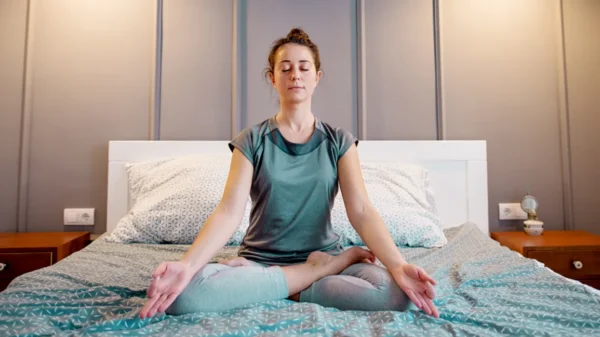Trendy Lifestyle Hacks
15 Tips To Improve Sleep Quality
Struggling with sleep? Quality rest is crucial for overall health and well-being, but many people find themselves tossing and turning each night.
To help you achieve better, more restorative sleep, here are 15 effective tips that can enhance your sleep quality and ensure you wake up feeling refreshed and energized.
1. Stick to a Consistent Sleep Schedule

Going to bed and waking up at the same time every day helps regulate your body’s internal clock. This consistency improves the quality of your sleep by reinforcing your natural sleep-wake cycle. Even on weekends, try to maintain this schedule to avoid disrupting your body’s rhythm and making it easier to fall asleep and wake up naturally.
2. Create a Relaxing Bedtime Routine

Establish a calming pre-sleep routine to signal to your body that it’s time to wind down. Engaging in relaxing activities, such as reading a book, taking a warm bath, or practicing gentle yoga or meditation, can help ease the transition from wakefulness to sleep. A consistent routine prepares your mind and body for restful sleep and reduces the stress that can interfere with falling asleep.
3. Optimize Your Sleep Environment

Make your bedroom a sleep-friendly environment by ensuring it is cool, dark, and quiet. A temperature between 60-67°F (15-19°C) is ideal for most people. Invest in a comfortable mattress and supportive pillows that suit your sleeping style. Consider using blackout curtains to block out light and a white noise machine to mask disruptive sounds, creating an ideal setting for uninterrupted sleep.
4. Limit Exposure to Screens Before Bed
Blue light from screens can interfere with the production of melatonin, a hormone that regulates sleep. To avoid this, limit your use of electronic devices such as smartphones, tablets, and computers at least an hour before bedtime. Instead, engage in activities that don’t involve screens, such as reading a physical book or practicing relaxation techniques, to promote better sleep.
5. Exercise Regularly

Engaging in regular physical activity helps regulate your sleep patterns and promotes deeper sleep. Aim for at least 30 minutes of moderate exercise most days of the week. Activities such as brisk walking, swimming, or cycling can be beneficial. However, avoid vigorous exercise close to bedtime, as it can increase adrenaline levels and make it harder to fall asleep.
6. Manage Stress and Anxiety

High stress levels and anxiety can significantly impact sleep quality. Incorporate relaxation techniques into your daily routine to help manage stress, such as deep breathing exercises, progressive muscle relaxation, or mindfulness meditation. By addressing stress and anxiety, you create a calmer mental state that supports better sleep.
7. Limit Naps During the Day
While napping can be beneficial, long or late naps can interfere with your nighttime sleep. If you need to nap, keep it brief (20-30 minutes) and avoid napping in the late afternoon. This helps ensure that you remain tired at bedtime and maintain a consistent sleep schedule throughout the night.
8. Stay Hydrated, but Not Too Much

Proper hydration is important for overall health, but drinking too much fluid before bed can lead to frequent trips to the bathroom during the night. Aim to drink plenty of water throughout the day, but reduce your fluid intake in the evening to minimize disruptions to your sleep.
9. Get Sunlight Exposure During the Day
Natural light exposure helps regulate your body’s sleep-wake cycle. Try to get outside during the day, especially in the morning, to boost your exposure to natural light. This can help reset your internal clock and improve your sleep quality by reinforcing the natural day-night rhythm.
10. Use Your Bed for Sleep Only

To strengthen the association between your bed and sleep, avoid using it for activities such as watching TV, working, or eating. By reserving your bed solely for sleep and intimacy, you condition your mind and body to associate your bed with restful sleep, making it easier to fall asleep.
11. Keep a Sleep Diary

Tracking your sleep patterns, habits, and any factors affecting your rest can help identify patterns or behaviors impacting your sleep quality. Record details such as bedtime, wake-up time, daily activities, and any sleep disturbances to gain insights into what might be contributing to your sleep issues.
12. Try Sleep-Inducing Herbs
Herbal remedies like chamomile tea, valerian root, or passionflower are known for their calming effects and may promote better sleep. Incorporate these natural sleep aids into your bedtime routine, but consult with a healthcare provider before trying new supplements to ensure they are safe for you.
13. Adjust Your Sleep Position

Finding a comfortable sleep position that supports proper alignment can improve sleep quality and reduce discomfort. Experiment with different positions, such as sleeping on your back, side, or stomach, and use supportive pillows to maintain proper alignment and alleviate any pain or stiffness.
14. Keep Your Room Free of Distractions
Create a peaceful sleep environment by eliminating potential distractions. This includes reducing noise levels, using blackout curtains to block light, and removing any clutter or electronics that may interfere with your ability to relax and fall asleep.
15. Invest in Quality Bedding
Comfortable and breathable bedding plays a significant role in sleep quality. Choose high-quality sheets, pillowcases, and comforters that suit your preferences for texture and temperature. Investing in quality bedding enhances your overall sleep experience and contributes to a more restful night.


